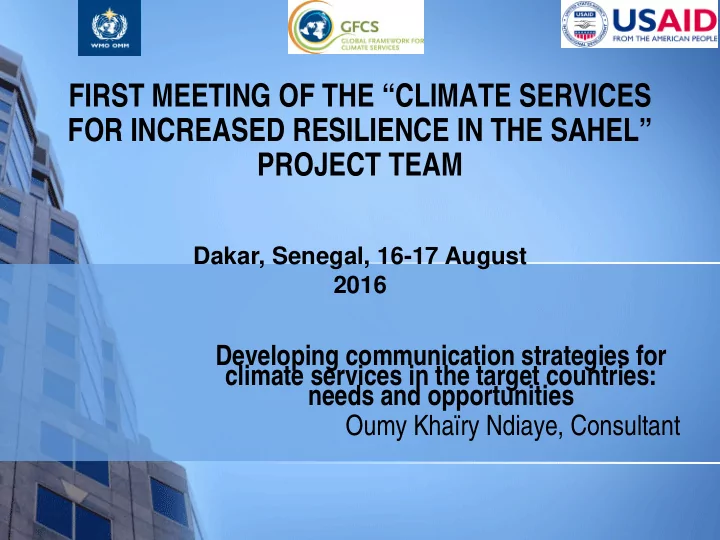

FIRST MEETING OF THE “CLIMATE SERVICES FOR INCREASED RESILIENCE IN THE SAHEL” PROJECT TEAM Dakar, Senegal, 16-17 August 2016 Developing communication strategies for climate services in the target countries: needs and opportunities Oumy Khaïry Ndiaye, Consultant
CONTENT WHAT DO WE KNOW? LESSONS FROM THE METAGRI COMMUNICATIONS ACTIVITIES AND THE GFCS NATIONAL ACTION PLANS EXERCISE WHAT IS SPECIFIC TO EACH OF THE 3 TARGET COUNTRIES ? WHAT IS COMMON TO THE 3 TARGET COUNTRIES ? NEEDS OPPORTUNITIES IMPORTANCE OF A REGIONAL PERSPECTIVE
WHAT DO WE KNOW ? Lessons from the METAGRI communications activities and the GFCS national action plans exercises : Recognition of the importance of communication by all stakeholders Recognition of ad hoc communication activities in most cases not derived from articulated communication strategies
WHAT DO WE KNOW ? Little or no knowledge of the basics of communication among met experts Little or no knowledge of the basics of met science among communication specialists Recognition of the need to sensitize end users on the wide potential of climates services
WHAT DO WE KNOW ? Recognition of the necessity to facilitate access to information and climates services – a web site designed for that purpose and the use of social media are a must Combining METAGRI and GFCS initiatives can strengthen and speed up implementation of national communication strategies
What is specific to each of the 3 target countries ? SENEGAL Communications activities performed with support from WMO/METAGRI and other partners (e.g. “Meteo media day” ; Collaborative management for a sustainable fisheries future in Senegal COMFISH/USAID (warning messages sent by sms partnership with Orange - around 1000 fisher folks receiving the sms alerts )
SENEGAL Scaling out useful climate services for increased resilience and productivity in Senegal, with support from CCAFS and WAAP/ISRA Choice of 2 main communication channels to reach end users : mobile phones and rural radio Video and TV used for institutional communication and visibility
SENEGAL Capacity building for communication specialists (3 training sessions for rural radio actors) linked to contractual arrangements with URACS , the network gathering all community radios in the country Involvement of all institutions responsible for food security at the regional level through the GTP
Burkina Faso Source : “Meteo media day” deliberations, October 2015, with support from METAGRI Revamping of the DGM web site to facilitate access to information by media- launching of the new web site planned for December 2015 mailing list including public and private media DGM willing to add email addresses of the “Meteo media day” participants
Burkina Faso A study by a local media consultancy firm identifies business models making the publication of climate services by some newspapers profitable
NIGER Daily forecasts on the tv Seasonal forecasts, publications from the GTP sent to a mailing list Special bulletins prepared for the press in case of emergency No collaboration with rural radios after 2 ”Meteo media days” (Niamey and Maradi, January 2015 )
What is common to the 3 target countries? Lack of human and financial resources to position communication for end users of climate services in the organizational chart of NMHS Recognition of the need for met experts and communication specialists to master ICT tools Acknowledgement of the difficult working conditions of the media, especially rural/community radios
Needs Capitalize the lessons from ad hoc communication activities to elaborate a comprehensive communication strategy for the provision of climate services ; such a strategy is different from institutional communication which remains critical for visibility It includes :
Communication strategy Mapping of the different categories of users of the climate services Identification of their communication needs Identification of the communicational assets of the geographical zones of implementation of the projects (e.g.: existence of rural/community radios, availability of mobile phone networks, use of social media, internet access, newspapers in local languages…. )
Communication strategy Identification of capacity building needs – organization of training sessions identification of most cost effective communication channels – negotiation of broadcast/dissemination and collection of feed back contracts Confection of messages relevant to the different categories of end users
Communication strategy NB : The confection of messages requires a glossary of the most used terms in provision of climate services in official and national languages Confection of monitoring and evaluation tools The strategy define a vision translated into periodic work plans taking into consideration the priorities and the available resources
Opportunities The 3 targeted countries have organized their national consultation workshop to define the Framework for climate services Communication needs are clearly expressed in the documents produced during the consultation and the related activities are identified and budgeted
Opportunities e.g. : sensitization campaigns to increase the awareness on the importance of climate services ; use of the power of networks, especially networks of communication specialists in the targeted countries ; Taking advantage of the competition among mobile services providers to negotiate profitable partnerships for sending sms, voice communication in floats etc..
Opportunities GFCS Africa is prepared to provide support for the elaboration and validation of communication strategies, and for hiring communication specialists for the implementation of the strategy Some sectors included in National Frameworks for Climate Services (e.g. Health) have experience in communication for development strategies and need less sensitization
Opportunities Ongoing projects may be approached for support to communication activities e.g. : Projet Alerte aux Canicules au Sahel et à leurs impacts sur la santé ACASIS Renforcement de l’information climatique et des systèmes d’alerte précoce en afrique pour le développement de la résilience et de l’adaptation au Changement climatique au Burkina Faso Building resilience and adaptation to climate Extremes and disasters (BRACED)
Importance of a regional perspective Building from successes in the target countries will facilitate elaboration of guidelines and scaling up The scarce resources for communication must be managed in order to allow an even implementation in all countries covered by GFCS and METAGRI Some material ( e.g. training, MoU) can be produced at the regional level and adapted with few adjustments at the national level
Recommend
More recommend